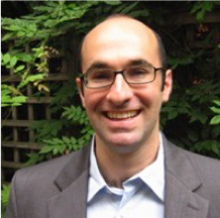MSE Seminar: Engineering Principles for Living and Biomolecular Materials

Assistant Professor
Departments of Materials Science and Engineering, Chemical and Biomolecular Engineering, and Chemistry
University of California, Irvine
Abstract: Biological organisms display many of the qualities desirable in advanced functional materials: self-organization, self-repair, “smart” response to environmental stimuli and complex, emergent functions. Bacteria are nature’s pioneers, able to adapt to nearly every inhabitable niche on earth, and in doing so, they provide blueprints for biologically inspired materials design. This talk will cover current research directions in the Hochbaum lab, where we study dense bacterial communities as prototypes for living materials and develop bacteria-inspired conductive materials to seamlessly integrate biology and synthetic electronics.
Microbial communities are ubiquitous and regulate processes spanning vast scales and ecological niches from the human microbiome to biogeochemical cycles. Surface-associated bacterial communities, called biofilms, represent a distinct state of microbial living in which cells coordinate cooperative behavior and emergent function. We parse and manipulate the interactions governing development and dispersal of bacterial biofilms. Using microfabricated surfaces, we design bacterial-material interfaces that modulate specific signaling pathways, controlling biofilm properties including metabolic activity, probiotic resistance to pathogens, and antibiotic susceptibility. These and other approaches enable the design of living materials to combat chronic infections and have potential applications in the production of biochemicals.
Other bacterial systems provide inspiration for new biomaterials design. In anoxic soils and sediment, bacteria evolved the ability to respire anaerobically using extracellular electron acceptors. Some of these species secrete electronically conductive protein nanofibers to access the oxidative potential of solid-state minerals. Inspired by these biological materials, we study mechanisms of electron transport in biomolecular conductors, design conductive, self-assembling peptide nanofibers, and develop biochemically programmed and reconfigurable conductive gels. These materials serve as an experimental platform to understand long-range charge transport in biological materials and as promising technological platforms for electronic sensing and actuation at enzymatic and cellular interfaces.
Bio: Allon Hochbaum is an assistant professor in the Department of Materials Science and Engineering, the Department of Chemical and Biomolecular Engineering, and the Department of Chemistry at UC Irvine. Hochbaum received his bachelor's degree in materials science and engineering from the Massachusetts Institute of Technology and completed his doctorate in chemistry at UC Berkeley, studying electrical and thermal transport phenomena in semiconductor nanowires. He was a postdoctoral research fellow in the School of Engineering and Applied Sciences and the Department of Chemistry & Chemical Biology at Harvard University, where he studied bacterial community dynamics at interfaces. Hochbaum is the recipient of the Samueli Faculty Career Development Professorship and 3M Non-tenured Faculty Award, and he is an ACS (Division of Inorganic Chemistry) and AFOSR Young Investigator. His lab studies and designs electronically conductive natural and synthetic biomaterials, and he seeks to understand and engineer chemical signaling pathways involved in bacterial community development and antibiotic tolerance using chemical and physical approaches.
Share
Upcoming Events
-
MSE 298 Seminar: Quasi-1D/2D Charge-Density-Wave Materials - From Exotic Physics to Application Prospects
-
EECS Seminar: Steering Diffusion Models for Generative AI, From Multimodal Priors to Test-Time Scaling
-
MAE 298 SEMINAR: Hypersonic Viscous Aerothermochemistry - External Aerothermodynamics and Scramjet Fuel-Air Mixing
-
CBE 298 Seminar: Finding Catalysts of Gut Reactions - The Gut Microbiota in Disease Onset and Treatment
-
CEE Seminar: Confirming a Critical Foundation of Global Warming - Direct Observational Evidence from Space of the Impact of CO2 Growth on Infrared Spectra
